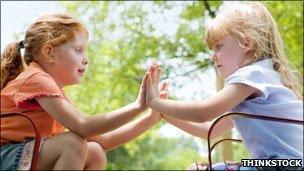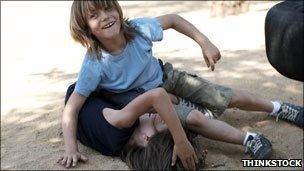Children 'give playground games a modern twist'
- Published

Researchers found singing, clapping, skipping, chasing and counting games
Children are using their experience of computer games and reality TV shows to give traditional playground games a modern twist, a study suggests.
Researchers found aspects of programmes like the Jeremy Kyle Show and Britain's Got Talent included in children's imaginative play.
Far from destroying their imagination, new technologies help to enrich it, the team from London and Sheffield says.
They observed play at two school playgrounds over two years.
The researchers from London's Institute of Education, University of East London and the University of Sheffield, also drew on archived recordings of children playing made by play researchers in the 1960s, 1970s and 1980s.
The study said: "Ever since children's games, songs, rhymes, rituals and objects of play were first documented in the mid-19th Century, there have been concerns over their vulnerability to a succession of perceived threats.
"They have regularly featured as symptoms of what adults imagine as the innocence of childhood, and its supposed fragility.
"In the late 19th and early 20th Centuries, perceptions of the disappearance of children's games led to muscular efforts to revive them, including the teaching to children of the songs and games supposedly lost.
"Research since then has has established beyond doubt, however, that this culture is much more robust than is often supposed."
It added: "We have found singing games, clapping games, counting-out games, chasing games, skipping games, games with playthings, and so on.
"At the same time, it is clear that some games have declined - we found no evidence of marbles, conkers or French skipping, for example, and limited evidence of hopscotch."
Jeremy Kyle
Some schools ban marbles and playing conkers from school playgrounds for health and safety reasons.
Professor Jackie Marsh, childhood expert at the University of Sheffield, said: "A lot of people talk about the demise of play but our project has found that is just not true.
"In fact, in some ways the scope for play now is wider. Children are drawing from computer games and online worlds for their games. Often people say, 'isn't that just copying?' but children are highly inventive.
"Children are living in a media age and we found them playing with reality TV shows like Big Brother, Jeremy Kyle and Who Wants to be a Millionaire?"
She said that they drew on programmes like Jeremy Kyle to work through issues that were relevant to them in their home surroundings, such as teenage pregnancy and drug misuse.

Play fighting is said to be a key part of children's development
Play involving characters from computer games and virtual worlds featured combat scenarios and the use of fantasy weapons, she said.
But there should not be anything worrying in this, because children have always engaged in play fighting as a way of understanding the violence they see around them either in real life or on television.
Some researchers see rough and tumble play as a key part of children's development, she added.
Today's children have to manage in an increasingly complex world of technology and information, she said.
The findings of the two-year project will be unveiled at the British Library on Tuesday, March 15.